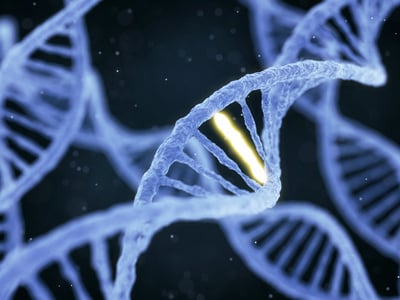FORCE's eXamining the Relevance of Articles for You (XRAY) program looks behind the headlines of cancer news to help you understand what the research means for you.
XRAY is a reliable source of hereditary cancer research-related news and information.
Learn more about the XRAY program
Categories Cancer Risk
Study : Do Vitamin B supplements alter breast cancer risk for women with BRCA mutations?
Most relevant for: High risk women with a BRCA1 or BRCA2 mutation
Vitamins are an essential part of our diet. Vitamin supplements are often used to improve general health. This study explores how vitamin B supplements may affect breast cancer risk in women with BRCA mutations. (5/17/19)
Read More
Relevance: Medium-High


Research Timeline: Post Approval


Guideline : Breast surgeons recommend genetic testing for all breast cancer patients
Relevance: Medium-High


Research Timeline: Post Approval


Most relevant for: Anyone diagnosed with breast cancer
The American Society of Breast Surgeons published statement on genetic testing for hereditary breast cancer on February 10, 2019. It includes recommendations about who should be tested. Among these is the recommendation that all breast cancer patients get genetic testing, as well as women who do not have breast cancer but fit the National Comprehensive Cancer Network (NCCN) guidelines. (3/25/19)
Read More
Relevance: High


Strength of Science: Medium-High


Research Timeline: Post Approval


Study : Gaps in information about breast cancer risk and prevention impact African American women
Relevance: High


Strength of Science: Medium-High


Research Timeline: Post Approval


Most relevant for: African American women who are at high risk for breast cancer
A study showed that African American women with increased breast cancer risk experienced greater burdens in obtaining information at each step compared to white women. Racial differences in preventive choices correlated with differences in information and provider access. (3/14/19)
Read More
Relevance: Medium-High


Strength of Science: Medium-High


Research Timeline: Post Approval


Study : Prevalence of BRCA founder mutations in Bahamian women
Relevance: Medium-High


Strength of Science: Medium-High


Research Timeline: Post Approval


Most relevant for: Bahamanian women
The Bahamas has the highest known frequency of BRCA mutations among people diagnosed with breast cancer. This study reviewed whether population-based BRCA testing (testing everyone regardless of family or personal history of cancer) would be an effective approach for finding mutation carriers in the Bahamas. (3/4/19)
Read More
Relevance: Medium-High


Strength of Science: Medium-High


Research Timeline: Human Research


Study : Improving outcomes for young women with breast cancer: fertility and childbearing issues
Relevance: Medium-High


Strength of Science: Medium-High


Research Timeline: Human Research


Most relevant for: Women diagnosed with breast cancer at a young age
Fertility issues and family planning decisions are prominent concerns for young women with breast cancer. This XRAYS looks at Dr. Ann Partridge’s presentation at the 2018 San Antonio Breast Cancer symposium. Her talk, “Breast cancer in young women: Understanding differences to improve outcomes," focused on initial findings from the Young Women's Breast Cancer Study. Dr. Partridge’s research continues in the currently enrolling POSITIVE trial which tests whether women can safely interrupt adjuvant endocrine therapy in order to get pregnant. (1/7/19)
Read More
Relevance: Medium-High


Strength of Science: Medium-High


Study : Breast cancer risk increases modestly after childbirth
Relevance: Medium-High


Strength of Science: Medium-High


Most relevant for: Women in their childbearing years
Does having children alter the risk of breast cancer? Women who give birth have a lower lifetime risk of breast cancer. However, newer data suggests that breast cancer risk increases immediately after childbirth. A study published in December 2018 examines data from the Premenopausal Breast Cancer Collective Group seeking to clarify this issue. (12/28/18)
Read More
Relevance: Medium-High


Strength of Science: High


Research Timeline: Post Approval


Study : Inherited breast cancer in Nigerian women
Relevance: Medium-High


Strength of Science: High


Research Timeline: Post Approval


Most relevant for: Nigerian women or women of Nigerian descent who have breast cancer
A new study shows that among Nigerian women, one in eight cases of breast cancer is due to an inherited mutation in BRCA1, BRCA2, PALB2 or TP53. (12/5/18)
Read More
Personal Story : Pamela Munster's story of cancer in the family
Most relevant for: People with an inherited mutation linked to cancer
In her essay in The Washington Post, Dr. Pamela Munster recounts her family's history with cancer associated with a mutation in the BRCA2 gene. She details her father's extraordinary journey with pancreatic cancer, one of the most aggressive and deadly cancers. (11/27/18)
Read More
Relevance: High


Strength of Science: High


Research Timeline: Post Approval


Study : Can population-based DNA sequencing find more people at risk for hereditary cancers?
Relevance: High


Strength of Science: High


Research Timeline: Post Approval


Most relevant for: Women over age 30
It is well documented that many BRCA mutation carriers are missed using current family history-based screening approaches. As a result, experts are beginning to call for population-based BRCA genetic testing—an organized effort to screen all women like we do for breast and cervical cancer. A recent study looked at whether a population-based genetic testing approach would better identify mutation carriers compared with current practice. (11/17/18)
Read More
Relevance: Medium-Low


Strength of Science: Medium


Research Timeline: Human Research


Study : A new method for determining whether genetic variants in BRCA1 increase cancer risk
Relevance: Medium-Low


Strength of Science: Medium


Research Timeline: Human Research


Most relevant for: People who have a Variant of Uncertain Significance in a gene associated with cancer risk.
Ever since BRCA1 was discovered, researchers have been trying to understand which of the thousands of possible DNA changes in this gene increase cancer risk and which are harmless changes. A new study in Nature reports how a cutting-edge technology called “genome editing” may be used to classify changes—known as variants of uncertain significance-in BRCA1 as harmful or harmless. Once validated, this same technology may be used to classify variants in other genes. (9/29/18)
Read More